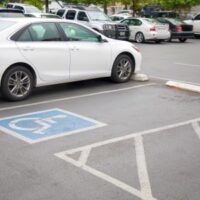Parking in a Handicapped Spot Can Lead to a Drug Arrest in Miami

A traffic stop is considered a “seizure” for purposes of the Fourth Amendment to the United States Constitution. This means that the police must have “probable cause” to believe the driver has committed some traffic violation before initiating the stop. Absent such probable cause, any incriminating evidence obtained from the driver or their vehicle is inadmissible as evidence in a Florida criminal trial.
Appeals Court Reverses Suppression of Evidence in Drug and Weapons Case
That said, even the most seemingly minor traffic infraction can create probable cause. Take this recent decision from the Florida Sixth District Court of Appeal, State v. Diaz. In this case, the appellate court reversed a trial judge’s decision to suppress evidence gathered during a traffic stop of the defendant.
The facts of the case are fairly simple. Two sheriff’s deputies in Orange County observed the defendant driving his vehicle and then stopping or parking in a handicapped space. The defendant’s vehicle did not have any sort of parking permit or a license plate used by people entitled to park in such spaces. Based on this, the deputies decided to initiate a traffic stop.
Initially, the deputies simply asked the defendant if he had a disabled parking permit or other documentation of a disability, which he did not. The deputies then asked the defendant to step out of his vehicle. He did so and admitted he was carrying a firearm without a concealed weapons permit. The deputies then conducted an inventory search of the vehicle, which revealed the presence of fentanyl and methamphetamine.
After receiving a Miranda warning, the defendant gave a voluntary statement to the police, in which he admitted to selling fentanyl “to make quick cash” after losing his job. He also acknowledged carrying the gun because he received threats from other local drug dealers. The officers arrested the defendant and charged him with drug possession and other crimes.
As previously mentioned, the trial court actually granted the defendant’s motion to suppress. The trial judge concluded that parking in a handicapped spot for “two minutes” was not enough to create probable cause to initiate a traffic stop. The Sixth District disagreed. It held the officers had probable cause, and as such the drugs recovered from the defendant’s car and his subsequent statements to the police were admissible evidence.
Contact a Miami Drug Distribution Attorney Today
The defendant in the case discussed above made a critical mistake in giving a voluntary statement to the police attempting to explain his actions. This is never a good idea. If the police arrest you on suspicion of a serious drug crime, your best course of action is to exercise your right to remain silent. The only person you should talk to is a qualified Miami drug distribution attorney who can advise you on a course of action moving forward. Call AsiliA Law Firm today at 786-420-3014 or contact us online to schedule an initial consultation.
Source:
6dca.flcourts.gov/content/download/2440421/opinion/Opinion_2023-3742.pdf
